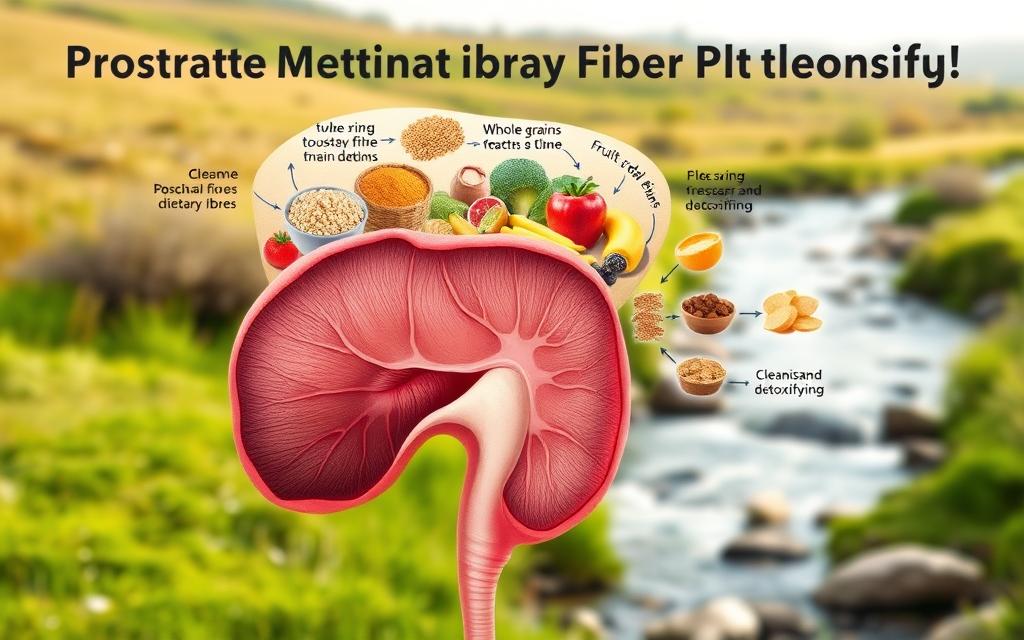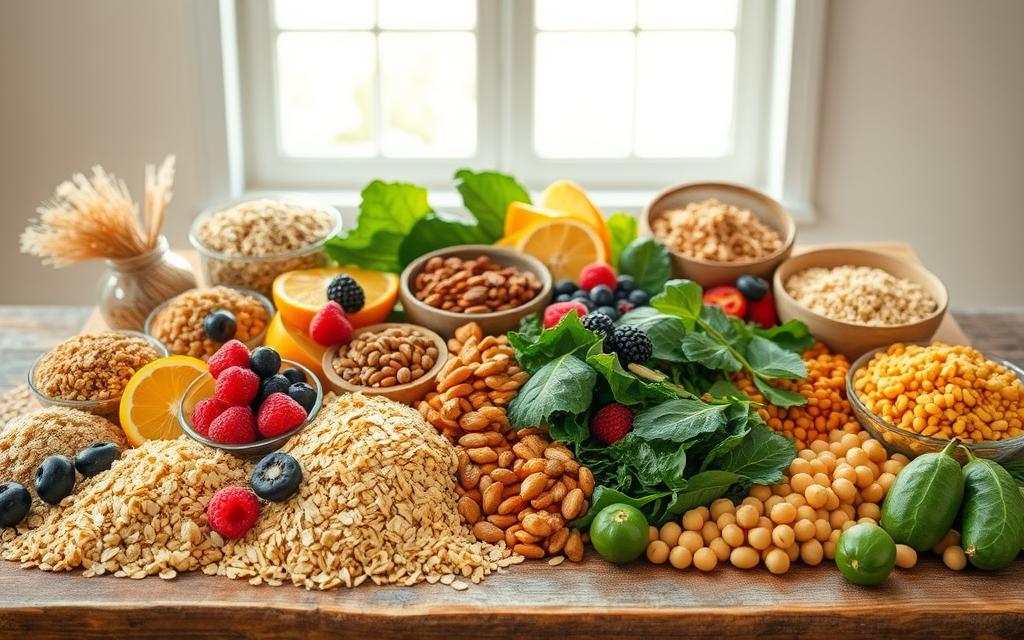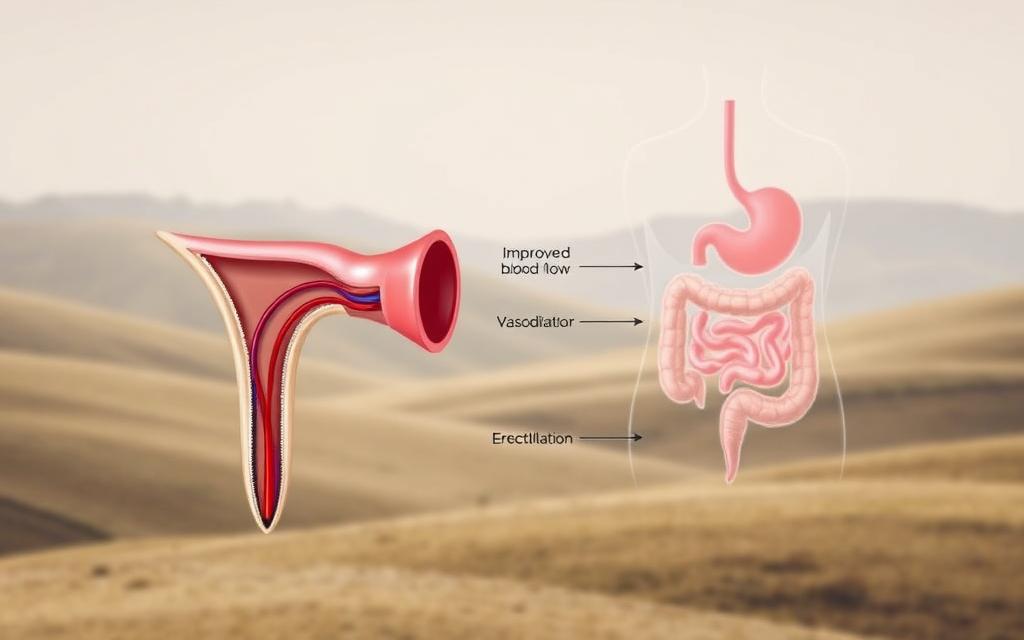How Fiber Intake Can Impact Erectile Dysfunction: Benefits and Tips
A healthy diet rich in fiber can have a significant impact on various aspects of health, including erectile dysfunction. Research suggests that a high-fiber diet can improve overall cardiovascular health, which is closely linked to erectile function.
Increasing fiber intake can also support prostate health, a factor that can influence erectile function. By focusing on dietary adjustments, individuals can potentially mitigate some symptoms of erectile dysfunction.
This article will explore the benefits of a high-fiber diet in relation to erectile health and provide practical tips on how to incorporate more fiber into your daily routine.
The Connection Between Diet and Erectile Function
The food we eat has a direct influence on our sexual well-being. A well-balanced diet not only supports overall health but also plays a significant role in maintaining erectile function. Nutritional choices can affect blood flow, cardiovascular health, and inflammation levels, all of which are crucial for sexual health.
How Nutrition Affects Blood Flow and Sexual Health
Nutrition significantly impacts blood flow, which is essential for erectile function. Foods rich in antioxidants and nitrates, such as leafy greens and berries, can help improve blood vessel function. A healthy diet that includes these foods can support sexual health by enhancing blood flow.
The Role of Fiber in Cardiovascular Health
A diet high in fiber can contribute to cardiovascular health by reducing cholesterol levels and improving blood vessel function. This, in turn, supports erectile function. Whole grains, fruits, and vegetables are rich in fiber and should be included in a diet aimed at improving cardiovascular health.
Inflammation Reduction and Sexual Function
Chronic inflammation can negatively impact sexual function. A diet rich in anti-inflammatory foods, such as omega-3 fatty acids found in fish and nuts, can help reduce inflammation. Combining these foods with a high-fiber diet can further support sexual health.
| Dietary Component | Benefit to Erectile Function |
|---|---|
| High Fiber Intake | Improves cardiovascular health, reducing the risk of erectile dysfunction |
| Antioxidant-Rich Foods | Enhances blood flow and overall sexual health |
| Anti-Inflammatory Foods | Reduces chronic inflammation, supporting sexual function |
Understanding Erectile Dysfunction and Its Causes
Erectile dysfunction (ED) is a complex condition that affects millions of men worldwide, and understanding its causes is crucial for effective management. It is not merely a sexual issue but often a symptom of underlying health problems.
Common Physiological Factors Contributing to ED
Several physiological factors can contribute to the development of erectile dysfunction. These include vascular diseases, such as atherosclerosis, which can impede blood flow to the penis. Neurological disorders, like diabetes and multiple sclerosis, can also damage the nerves controlling erection.
Another significant factor is the presence of cardiovascular disease, which can affect the blood vessels and reduce blood flow. Lifestyle factors, including smoking and lack of physical activity, can exacerbate these conditions.
The Relationship Between Prostate Health and Erectile Function
Prostate health is closely linked to erectile function. Conditions such as prostatitis or benign prostatic hyperplasia (BPH) can cause ED due to the proximity of the prostate to the nerves and blood vessels involved in erection.
Treatments for prostate issues, including surgery, can sometimes result in ED. However, understanding the relationship between prostate health and erectile function can help in managing and potentially mitigating these effects.
Hormonal Influences and Dietary Connections
Hormonal imbalances, particularly low levels of testosterone, can significantly impact erectile function. Diet plays a crucial role in maintaining hormonal balance. Consuming a diet rich in whole foods, such as fruits, vegetables, and whole grains, can support hormonal health.
| Hormone | Dietary Influence | Impact on ED |
|---|---|---|
| Testosterone | Zinc-rich foods (oysters, beef) | Supports erectile function |
| Testosterone | Vitamin D-rich foods (fatty fish, egg yolks) | Maintains healthy testosterone levels |
| Insulin | High-fiber foods (legumes, whole grains) | Regulates blood sugar, reducing ED risk |
Understanding the causes of erectile dysfunction and its connections to physiological factors, prostate health, and hormonal influences is key to addressing this condition effectively.
Does Prostate Cancer Treatment Cause Erectile Dysfunction?
The impact of prostate cancer treatment on erectile dysfunction is a significant concern for many men. Prostate cancer treatments, while crucial for saving lives, can have various implications for a man’s sexual health.
Types of Prostate Cancer Treatments and Their Effects on Sexual Function
There are several types of prostate cancer treatments, including surgery, radiation therapy, and hormone therapy. Each of these treatments can affect sexual function differently. For instance, surgical interventions like prostatectomy can damage the nerves surrounding the prostate, potentially leading to erectile dysfunction.
Radiation therapy, on the other hand, can cause damage to the blood vessels and nerves, impacting erectile function over time. Hormone therapy, which is used to reduce testosterone levels, can also affect libido and erectile function.
Statistics on ED Following Different Treatment Approaches
Studies have shown varying rates of erectile dysfunction following prostate cancer treatment. According to research, the prevalence of ED after prostatectomy can range from 30% to 90%, depending on the surgical technique and the patient’s pre-operative erectile function.
| Treatment Type | Prevalence of ED |
|---|---|
| Prostatectomy | 30% – 90% |
| Radiation Therapy | 20% – 60% |
| Hormone Therapy | 50% – 80% |
Recovery Possibilities and Nutritional Support During Recovery
While the risk of erectile dysfunction is significant, it’s not inevitable. Many men experience recovery of their sexual function over time, with or without treatment. Nutritional support plays a crucial role in this recovery process. A diet rich in fiber, along with other essential nutrients, can support overall vascular health, potentially aiding in the recovery of erectile function.
Nutritional Tips for Recovery:
- Incorporate fiber-rich foods like whole grains, fruits, and vegetables into your diet.
- Stay hydrated to support overall health.
- Consider consulting a healthcare provider or a nutritionist for personalized dietary advice.
How Dietary Fiber Supports Prostate Health
Dietary fiber plays a crucial role in maintaining prostate health, and understanding its benefits can be a game-changer for men concerned about their sexual and prostate well-being. A well-balanced diet rich in fiber can contribute to overall health, and recent studies have highlighted its specific benefits for prostate health.
Soluble vs. Insoluble Fiber Benefits
Dietary fiber comes in two main forms: soluble and insoluble. Soluble fiber, found in foods like oats, barley, and fruits, can help lower cholesterol levels and improve blood sugar control. Insoluble fiber, found in whole grains, vegetables, and nuts, aids in promoting regular bowel movements and preventing constipation. Both types of fiber are essential for maintaining a healthy digestive system and supporting prostate health.

Research on Fiber’s Impact on Prostate Function and Inflammation
Research has shown that a high-fiber diet can help reduce inflammation in the body, which is a significant factor in prostate health. Chronic inflammation is associated with various prostate issues, including prostatitis and prostate cancer. By incorporating more fiber into their diet, men can potentially reduce their risk of developing these conditions.
Recommended Daily Fiber Intake for Men with Prostate Concerns
The daily recommended intake of fiber varies by age, but generally, men are advised to consume between 25 to 30 grams of fiber per day. For men with prostate concerns, ensuring adequate fiber intake is crucial. The following table summarizes the recommended daily fiber intake and examples of high-fiber foods:
| Age Group | Recommended Daily Fiber Intake | Examples of High-Fiber Foods |
|---|---|---|
| Men 50 and younger | 30-38 grams | Oats, barley, fruits, and vegetables |
| Men over 50 | 25-30 grams | Whole grains, nuts, seeds, and legumes |
Increasing dietary fiber intake can be achieved through simple dietary changes, such as incorporating more whole grains, fruits, and vegetables into meals. By doing so, men can take a proactive step towards supporting their prostate health.
Fiber-Rich Foods That May Help Improve Erectile Function
A diet rich in fiber not only supports overall health but may also play a role in enhancing erectile function. Fiber-rich foods are known for their numerous health benefits, including improving vascular health, which is crucial for erectile function.
Whole Grains and Their Vascular Benefits
Whole grains are an excellent source of dietary fiber and other essential nutrients. They include foods like brown rice, quinoa, and whole-wheat bread. Consuming whole grains can help improve blood flow and reduce inflammation, both of which are beneficial for erectile health. For more information on how diet impacts erectile dysfunction, you can visit Colorado Urologists.
Fruits and Vegetables High in Fiber and Antioxidants
Fruits and vegetables are not only rich in fiber but also in antioxidants, which help protect against oxidative stress and inflammation. Berries, apples, broccoli, and carrots are examples of such foods. These nutrients support overall vascular health and can contribute to better erectile function.
Nuts, Seeds, and Legumes for Hormonal and Prostate Health
Nuts, seeds, and legumes are other fiber-rich food categories that support hormonal balance and prostate health. Almonds, chia seeds, and lentils are good examples. They provide essential nutrients and fiber that can help in maintaining healthy testosterone levels and prostate function.
| Food Category | Fiber Content | Benefits for Erectile Health |
|---|---|---|
| Whole Grains | High in soluble and insoluble fiber | Improves blood flow, reduces inflammation |
| Fruits and Vegetables | Rich in fiber and antioxidants | Protects against oxidative stress, supports vascular health |
| Nuts, Seeds, and Legumes | Good source of fiber and essential nutrients | Supports hormonal balance, prostate health |
Incorporating these fiber-rich foods into your diet can be a beneficial step towards improving erectile function and overall health. A balanced diet combined with a healthy lifestyle can significantly impact sexual health.
Practical Tips for Increasing Fiber in Your Post-Treatment Diet
Increasing fiber intake is a simple yet effective way to support prostate health and aid in ED recovery post-treatment. A high-fiber diet can help improve cardiovascular health, reduce inflammation, and promote overall well-being.
Gradual Implementation Strategies for Sensitive Digestive Systems
For individuals with sensitive digestive systems, it’s crucial to introduce fiber gradually to avoid discomfort. Start by adding small amounts of fiber-rich foods to your meals and gradually increase the portion sizes over time. This approach allows your digestive system to adjust to the change.
Tips for Gradual Fiber Increase:
- Begin with small servings of fiber-rich foods.
- Gradually increase fiber intake over a few weeks.
- Monitor your body’s response and adjust accordingly.
Meal Planning Ideas for Prostate Health
Effective meal planning is key to incorporating more fiber into your diet. Focus on whole grains, fruits, vegetables, nuts, and legumes. Here are some meal ideas:
| Meal | Fiber-Rich Foods | Benefits |
|---|---|---|
| Breakfast | Oatmeal with berries | High in soluble fiber, supports heart health |
| Lunch | Whole grain bread with avocado and vegetables | Rich in healthy fats and fiber |
| Dinner | Lentil soup with whole grain crackers | High in protein and fiber, supports prostate health |
Combining Fiber with Other Beneficial Nutrients for ED Recovery
Combining a high-fiber diet with other beneficial nutrients can enhance ED recovery. Foods rich in antioxidants, such as vitamins C and E, and minerals like zinc, can support prostate health and erectile function.
Nutritional Support for ED Recovery:
- Antioxidant-rich foods like berries and leafy greens.
- Zinc-rich foods such as oysters and pumpkin seeds.
- Healthy fats found in nuts and avocados.

By incorporating these nutritional elements into your post-treatment diet, you can support your overall health and potentially improve erectile function.
Conclusion: Integrating Fiber for Better Prostate and Sexual Health
Incorporating fiber into your diet is a simple yet effective way to support prostate and sexual health. A high-fiber diet can help improve erectile function by promoting cardiovascular health, reducing inflammation, and supporting hormonal balance.
By focusing on whole grains, fruits, vegetables, nuts, and legumes, individuals can make informed dietary choices that support their overall well-being. Gradually increasing fiber intake and combining it with other beneficial nutrients can enhance the positive impact on prostate health and sexual function.
The integration of fiber-rich foods into one’s diet can be a valuable step towards mitigating the risk of erectile dysfunction and supporting recovery after prostate cancer treatment. By making these dietary adjustments, individuals can take a proactive approach to maintaining their prostate and sexual health.
